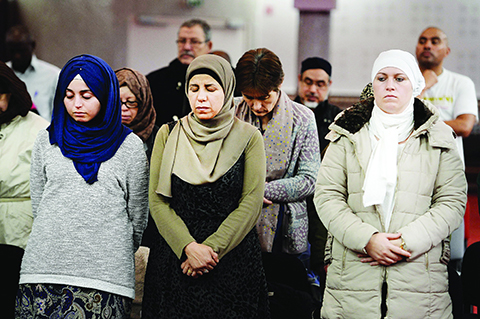 Muslim women observe a minute of silence at the Assalam Mosque of Nantes, western France, to pay tribute to the victims of the November 13 Paris terror attacks. Gunmen and suicide bombers went on a killing spree in Paris, attacking a concert hall, bars, restaurants and the Stade de France on November 13. Islamic State jihadists operating out of Iraq and Syria released a statement claiming responsibility for the coordinated attacks that killed 130 people and left 352 others injured. AFP PHOTO
Muslim women observe a minute of silence at the Assalam Mosque of Nantes, western France, to pay tribute to the victims of the November 13 Paris terror attacks. Gunmen and suicide bombers went on a killing spree in Paris, attacking a concert hall, bars, restaurants and the Stade de France on November 13. Islamic State jihadists operating out of Iraq and Syria released a statement claiming responsibility for the coordinated attacks that killed 130 people and left 352 others injured. AFP PHOTO BRUSSELS: EU interior and justice ministers in Brussels yesterday pledged solidarity with France in the wake of the Paris attacks a week ago and agreed a series of new measures on surveillance, border checks and gun control. French Interior Minister Bernard Cazeneuve asked for the crisis meeting after the attack in Paris last Friday in which Islamic State radicals with ties to Syria and a planning cell based in Belgium killed 129 people across the city.
"We must be implacable in our determination, we must speed up our action, otherwise Europe will lose its way," he said after the 28 governments agreed to speed new legislation to share air passengers' data, curb firearms trafficking and ensure closer checks on EU citizens crossing Europe's external borders.
"We need to act firmly, we need to act swiftly and with force," Cazeneuve said after the Luxembourg minister who chaired the meeting confirmed the formal approval of an agreement reached among officials earlier in the week. Those draft conclusions, seen by Reuters on Thursday, included agreement to "implement immediately the necessary systematic and coordinated checks at external borders, including on individuals enjoying the right of free movement".
Citizens of the 26 Schengen countries have their documents visually checked by security forces when they leave or enter the area. The new proposal is likely to upgrade the controls so documents are systematically checked against criminal and security databases. Some of the Belgian and French suspects involved in the Paris attacks had travelled to fight in Syria and returned, apparently undetected, to Europe.
Officials have said some may have taken advantage of the large influx of refugees from Syria over the summer to evade normal border controls. The EU agency for border controls, Frontex, is to get a stronger mandate to contribute to the fight against terrorism.
Solidarity
German Interior Minister Thomas de Maiziere said before the meeting: "We are here to show our French colleagues, and the French people, that we stand by them and that we are determined to make a tough, clear response." He said it was vital that Europe's national security services do more to share information, something echoed by his Italian counterpart.
Dimitris Avramopoulos, the European commissioner for internal affairs and migration, said the EU executive would propose a common "European intelligence agency". It is an idea that has been floated by some politicians but which others have said may be a step too far for many governments, whose sovereignty over national security issues is enshrined in EU treaties. Ministers will also call for a deal by the end of the year on sharing airline travelers' data, the so-called Passenger Name Record (PNR) program, which has long been stalled in the European Parliament over concerns for privacy. - Reuters










